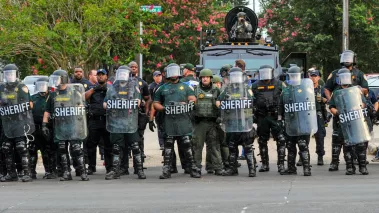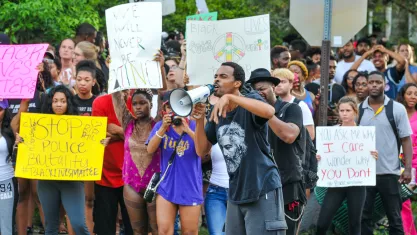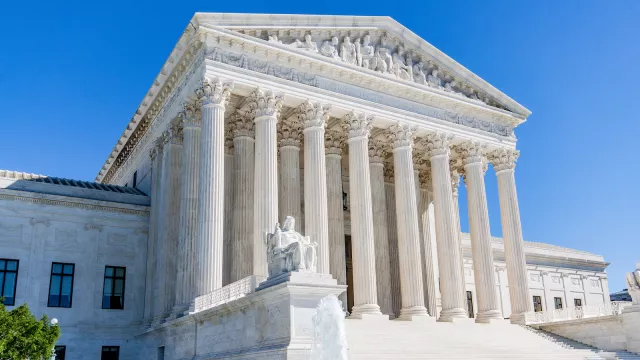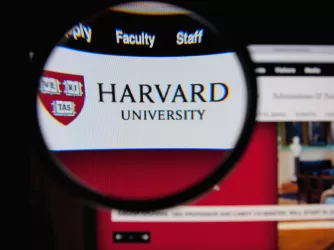Table of Contents
A troubling decision threatens to chill the freedom to protest

Scott Clause / The Advertiser / USA TODAY NETWORK
Baton Rouge police respond to crowds protesting the killing of Alton Sterling on July 10, 2016.
The Sons of Liberty protests against taxes on newspapers and tea. The Women’s Suffrage Parade. The Selma Marches. These historic events demonstrate the power of a core American value: the freedom to gather and demonstrate. That freedom has given millions a voice to open the eyes of their fellow Americans and demand change. After all, there’s a reason the First Amendment protects not only the freedom of speech, but also the right to peacefully assemble.
But a recent decision from the U.S. Court of Appeals for the Fifth Circuit in Doe v. McKesson creates a dangerous rule that exposes protest leaders to liability for the rogue act of a fellow demonstrator and threatens to chill First Amendment-protected protest.
In July 2016, protests unfolded in Baton Rouge, Louisiana, after local police shot and killed Alton Sterling, a 37-year-old Black man. It was the first of two high profile police shootings of Black men within several days, capturing the nation’s attention and fueling large demonstrations.

DeRay Mckesson, a civil rights activist, helped stage one of those protests. He and other demonstrators gathered near a police station, eventually occupying the highway in front of the station. As officers began arresting demonstrators to clear the highway, someone threw a rock that struck and injured a police officer. Unable to identify the rock-hurler, the officer instead sued Mckesson for damages, alleging that even though Mckesson didn’t throw the rock, he was still responsible for the officer’s injuries because he organized the protest.
If people can sue demonstrators for the unlawful acts of others, it will deter all but the hardiest Americans from exercising their rights to assemble and demonstrate. In fact, the Supreme Court recognized this threat in its 1982 decision NAACP v. Claiborne Hardware, holding that the First Amendment shielded civil rights leaders from liability for their nonviolent boycott to “bring about political, social, and economic change.” Observing that First Amendment activity and violence often exist at mass protests, the Supreme Court concluded that “civil liability may not be imposed merely because an individual belonged to a group, some members of which committed acts of violence.” Only if a demonstrator (1) authorizes or directs unlawful activity, (2) incites imminent and likely lawless action, (3) or gives specific instructions to carry out violence could they be liable for the resulting consequences, the Supreme Court reasoned.

FIRE asks Supreme Court to uphold First Amendment right to boycott
News
Political boycotts are protected expression under the First Amendment, but a recent rash of laws bar government contractors from participating in boycotts of goods and services originating from Israel.
You might imagine that Claiborne Hardware would have made short work of the lawsuit against Mckesson. Yet the lawsuit persists seven years after the protest, thanks to a decision handed down this month by a 2-1 panel majority from the Fifth Circuit.
Looking to the three narrow exceptions in Claiborne, the majority concluded that “Mckesson had a duty to exercise reasonable care in organizing the Black Lives Matter protest, and that [he] breached that duty in organizing the protest in such a manner where it was reasonably foreseeable that a violent confrontation with the police would result.” But as Judge Don Willett’s dissent argued, the majority’s reasoning “dodges Claiborne and clashes head-on with constitutional fundamentals,” especially because Mckesson “cannot be liable for violence unless he encouraged violence.” The police officer’s lawsuit, as Judge Willett observed, fails to detail how Mckesson even once encouraged violence.
FIRE is troubled by the Fifth Circuit’s opinion. A rule that exposes non-violent protest leaders to liability for the acts of others—whether it be a rogue protestor, an unruly counter protestor, or even a police officer using force at the scene—is a threat to our American tradition of protecting the power of speech in numbers to bring about change.
Recent Articles
FIRE’s award-winning Newsdesk covers the free speech news you need to stay informed.

‘I hate freedom of opinion’ meme leads to sentencing in German court

Revoking Harvard’s tax-exempt status will threaten all nonprofits

Grandpa’s advice for the new wave of American censors


